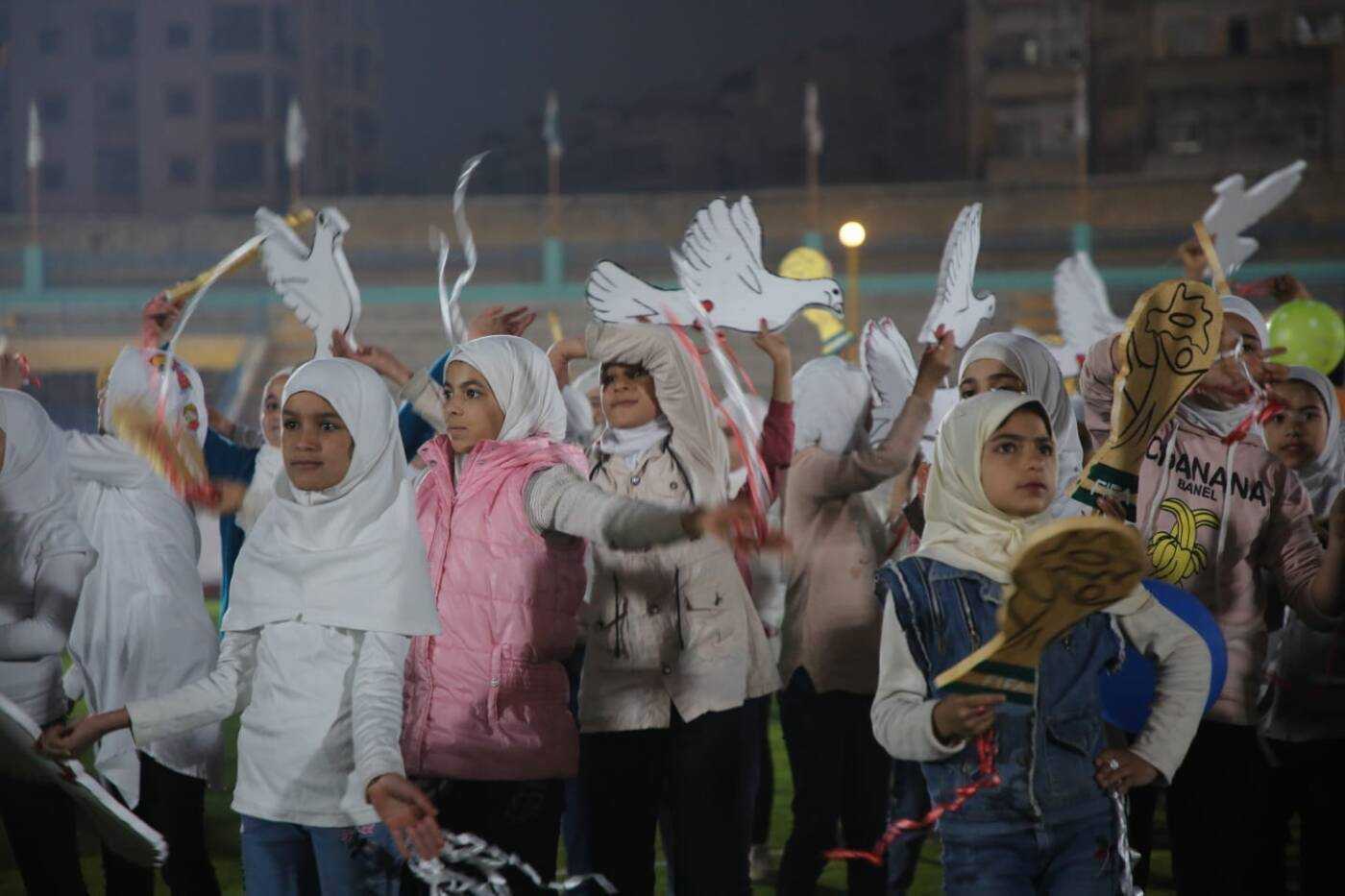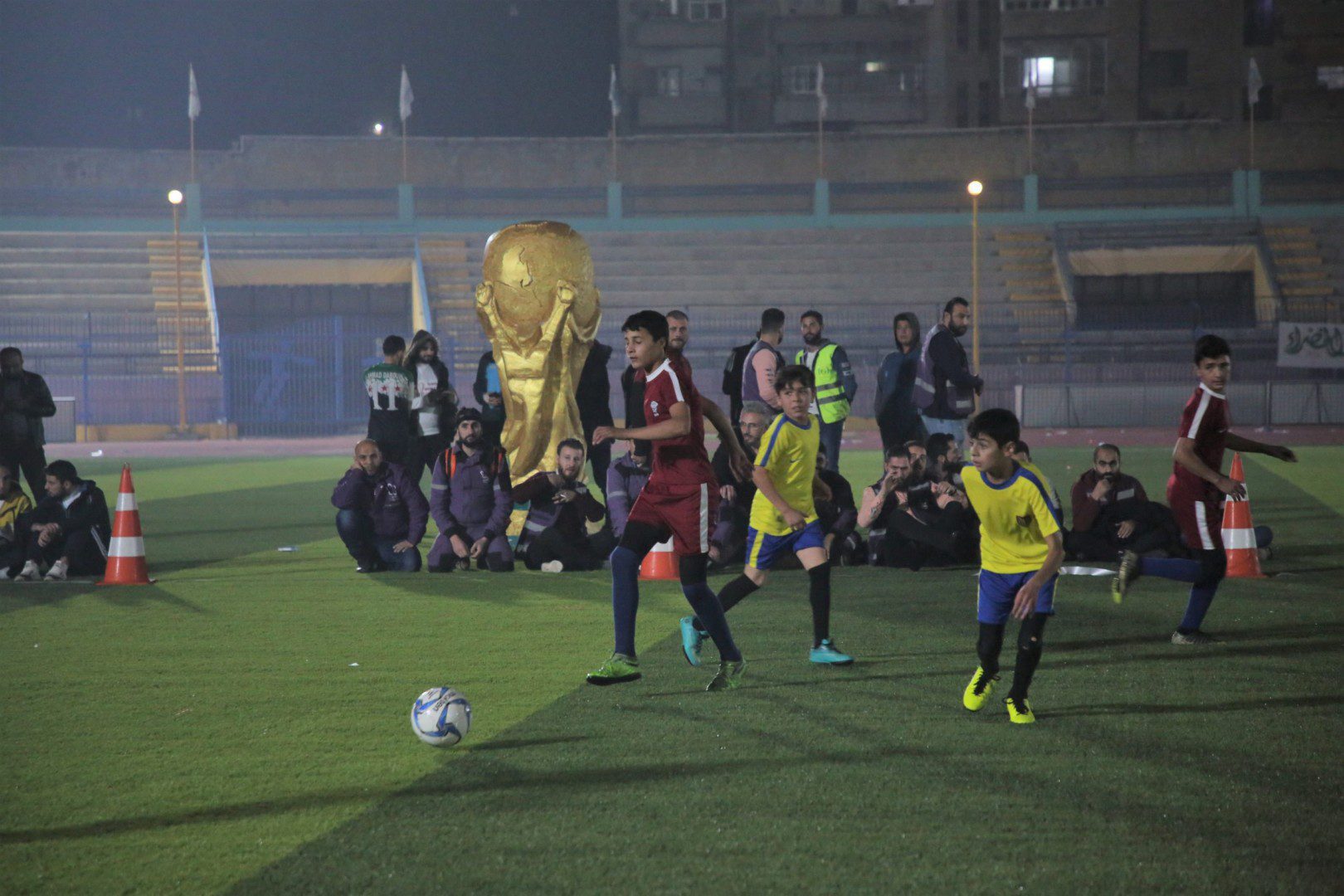Idlib’s World Cup: Children of the camps take the field
Coinciding with the 2022 World Cup in Qatar, more than 300 children who live in displacement camps or work in opposition-controlled Idlib are participating in a parallel soccer tournament: the Camps World Cup.
21 November 2022
IDLIB — Coinciding with the start of the Qatar 2022 World Cup on Sunday, another tournament was underway in northwestern Syria’s Idlib province. The Camps World Cup, organized by local NGO Violet, brings together hundreds of children who live in displacement camps and work in the province’s industrial zones in a parallel sporting event aimed at drawing attention to their lived realities.
The Idlib tournament mirrors the world’s largest football championship, with children from 25 camps and seven industrial areas of the province split into 32 national teams playing parallel matches to those in Qatar. On Saturday, the competition kicked off with an opening ceremony at the Idlib Municipal Stadium, in which 320 displaced children participated, according to organizers.
Ibrahim Mashar, 14, is playing for Brazil. Displaced with his family to Sarmin city east of Idlib, he hopes to be “the best player in the Idlib World Cup,” he told Syria Direct. He loves soccer, which he calls “my whole life.”
“I’m participating in the tournament to tell the world we won’t give up on our hobbies and dreams because of the war. We have the right to dream about anything,” Mashar said. But his own soccer dreams run up against his reality in Idlib province. “I can’t join sports academies that develop talents, like children in other countries, because I live in Idlib, and I can’t leave,” he said.
To participate in the games, Ibrahim is taking time off from his usual work at an electrical wiring workshop in Idlib’s industrial city area. For his family, like those of other children participating in the Camps World Cup, the struggle to get by in Idlib leaves little opportunity to develop their children’s sports skills or enroll them in local sports centers.
Supporting camp children
Six months ago, Ibrahim joined sports trainings held by Violet to prepare for the tournament, which will be held at the municipal stadium in Hazano, a town in the northern Idlib countryside. Stopping work to devote himself to preparing for the games was a return to childhood.
His story is that of dozens of other players in the Camps World Cup, which aims to shed light on the situation of children in Idlib’s displacement camps and to advocate for their right to return to a normal life and childhood, according to Hisham Dirani, Violet’s executive director.
“There are children who love life and playing sports, if the opportunity is available to them,” he said. The games are also a way to show “there is an opportunity for life in Idlib, which is not just areas of death and pain.”
Idlib province, controlled by hardline opposition group Hay’at Tahrir al-Sham (HTS), is one of the last parts of Syria that remains outside regime control. An estimated 1.8 million displaced people live in more than 1,600 camps in Idlib and neighboring parts of Aleppo province controlled by Turkish-backed opposition groups.
Some 67 percent of camps in northwestern Syria—998 in total—have no educational points or schools, said Mohammad Hallaj, director of the Syrian Response Coordination Group. As a result, children “travel long distances in varying weather conditions to get their right to an education.”
Child labor is also a “major concern, as 35 percent of children in the camps in the 14-17 age group” work, Hallaj added. Ibrahim, like other children taking part in the tournament, is among them.
The two groups of children in Idlib who are participating in the Camps World Cup—displaced children and those who work in the province’s industrial areas—“face the most serious, health- and life-threatening risks, and they don’t have opportunities to access their right to play,” said Ibrahim Sarmini, coordinator of Violet’s protection program in Idlib.
The beginning of the Qatar World Cup, which fell on International Children’s Day on November 20, was an opportunity to “draw attention to childhood in Idlib, especially with the start of winter,” Sarmini said.

Girls participate in the opening ceremony of the Camps World Cup in Idlib. They were among 320 children participating in the events, 19/11/2022 (Mahmoud Hamza/Syria Direct)
Ahmad, Ibrahim’s older brother, is supporting him. He hopes “Ibrahim and his friends present something special, in their own way, and can get their message out to the world: that we are no different from other people on Earth, except for that we live in Syria, in difficult humanitarian conditions.”
A space to dream
On November 24, Ibrahim will play his first match in the Idlib cup, wearing the shirt of the Brazilian national team to face off against other children representing Serbia. In the future, he hopes to be “a player on the Syrian national team, and to participate in the next World Cup.”
But “getting Ibrahim out of the work atmosphere to practice his hobby in an organized way is the biggest gain,” his brother Ahmad said. “No matter how talented a child is in soccer, he has to be trained and develop his talent with specialists and athletes.”
Six months ago, participating children were selected based on their talents and assessments by Violet’s coaches in Idlib camps, Habib Mardaa, the training technical supervisor said. Children then participated in six months of theoretical and practical training by coaches.
Organizers of the tournament hope to open channels of communication between local children and international players to promote support for sports in northern Syria, Dirani said. “The idea, if it succeeds, will have a great positive impact on the hearts of children and youth, and put them on the path to achieving their sports dreams.”
Challenging reality
Hussein Abu Ahmad (a pseudonym), the father of one of the players, welcomes the tournament as a way to give Syrians something to focus on outside their difficult circumstances.
Abu Ahmad and his family have lived in Idlib’s Atma camps since they were displaced from Kafr Nubl city in the southern Idlib countryside, in 2022. He accompanies his son Ahmad, 13, to all his sports matches, and plans to do the same during the Camps World Cup in Idlib, he told Syria Direct.
Although the situation of sports in Idlib is not conducive to “highlighting and investing in my son’s skills, I have never given up hope,” he said. “Perhaps Ahmad will get the chance to realize his dream of playing for a club outside Syria.”
In his view, the “symbolic” World Cup can “help children and sports fans to challenge their reality, to express their dreams and aspirations.” A soccer lover himself, Abu Ahmad hopes similar tournaments can be held for adults, too, “to get us out of the reality we live in.”
The Camps World Cup is not the first time Violet has organized a sporting event alongside international competitions. In 2022, it held a local Olympics coinciding with the 2022 Beijing Winter Olympics, a Mediterranean Games alongside those held in Algeria this summer and a Camp Champions League alongside the European Champions League, Sarmini said.
After more than 11 years of war and upheaval in Syria, sports tournaments like these can transport children, at least for four quarters, to another reality, and help them achieve their dreams or play sports as one of their most basic rights. They are a way for children like Ibrahim and Ahmad to send their message: that they have the right to play, and not simply live and work in the misery of camps and industrial zones.
This report was originally published in Arabic and translated into English by Mateo Nelson.







